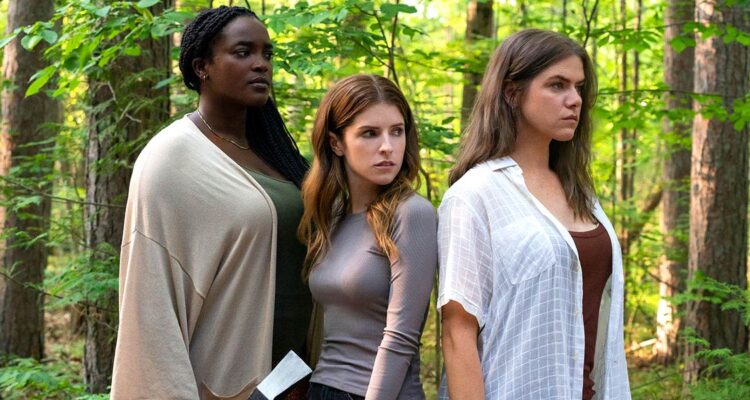Intimate partner violence can take on many forms. Physical, sexual, emotional, and psychological. Once caught up in the cycle, many women are made to feel such shame that they cannot even share their experiences with those closest to them. It’s in the midst of this spiral of shame that we meet the titular Alice (Anna Kendrick, “Pitch Perfect”) in “Alice, Darling.” Written by Alanna Francis and directed by Mary Nighy (“Industry”), the drama takes a stark look at the physical and psychological toll that emotional abuse can take on a person.
On the surface, Alice’s life is perfect. She lives in a stylish Toronto apartment with her tall, handsome, British, artist boyfriend Simon (Charlie Carrick, “Departure”). But from the start, it’s clear something is off about their relationship. While having drinks with her lifelong friends Tess (Kaniehtiio Horn, “Letterkenny”) and Sophie (the always fantastic Wunmi Mosaku, “Lovecraft Country”), the pings of his texts are constant in the background. Back home when Alice notices a flirty waiter slipped her his number, she desperately tries to destroy the paper with water in the kitchen sink. As soon as she wakes in the morning, she runs to the bathroom to make sure her pits and legs are shaved, her hair is curled, and her eyeliner perfect before Simon has a chance to criticize her.
READ MORE: TIFF 2022: 16 Must-See Films To See At The Toronto Film Festival
Invited by Sophie to her family’s cabin for a weeklong trip to celebrate Tess’ birthday, Alice has to practice a convincing lie about a work trip, so Simon will let her go. Once on the trip, Alice becomes agitated, often tightly twisting her long hair around her fingers until strands come out in her hand. After Sophie notices signs of disordered eating and Tess witnesses Alice frantically attempting to retrieve a pair of earrings from the bottom of the lake, her friends realize that something is terribly wrong.
Kendrick gives a phenomenal performance, with her insides so twisted that the tension is visible in every limb, in every move she makes. Alice is a woman trapped in an internal cage, unable to ever really breathe freely. Her heaving panic attacks are visceral, with every breath a gasp. Every yank of her hair is a physical punishment she gives herself for thinking bad thoughts about this man who has wrecked her so thoroughly, or maybe as punishment for letting herself get into this situation in the first place.
Nighy films the couple in tight close-ups, with Carrick’s large body dominating every inch of the frame, just as he does her mind. We see his total domination of her thoughts through quick flashes, which paint a picture of sexual coercion, as well as gaslighting, and verbal abuse. Each barb of his tongue stings Alice just as badly as a lash from a belt or sock in the face would. The wounds, however, remain invisible to everyone but her.
READ MORE: Fall 2022 Preview: 60+ Must-See Films To Watch
While Alice silently contemplates her abusive situation and her friends try to understand her angsty mood, a search for a missing teenage girl is happening in the area near the cabin. Alice overhears some women in a grocery store blaming the girl. “How could she put herself in that situation?” they snidely ask. Alice has likely asked herself this same question and fears her friends will ask with the same condescending tone if she reveals how bad it’s gotten. This is how thoroughly Simon has made her hate herself.
But “Alice, Darling” does not just dwell on the way Alice has been brutalized. It shows the strength women have when they stick together. This is why men like Simon try to isolate the women they abuse. She may have hidden it well when they see each other in short bursts, but after a few days together, Sophie and Tess easily see the changes in Alice and help her see them in herself. In spending time together, they also help her find her way back to the woman she was. One particularly delightful sequence includes the three drunkenly attempting to sing “Stay (I Missed You)” by Lisa Loeb while walking home after a night out. Alice has been starved of this kind of true, unconditional love and emotional support for so long that it now has transformative power.
As the film comes to its inevitable conclusion, Carrick’s towering frame has been brought down a notch by the power in numbers that Sophie and Tess’ protection offer Alice. When an action taken by Sophie finally breaks the spell he has over her for good, the whole auditorium gasped and cheered. When Alice could breathe again, we could breathe again.
Anchored by Kendrick’s best performance in years and Francis’ incisive script, “Alice, Darling” is a visceral, deeply felt clarion call, not just for more awareness of the signs of emotional, intimate partner violence but also as a reminder to those who have experienced this abuse to allow themselves some grace. [B]
Follow along with all our coverage of the 2022 Toronto International Film Festival.

